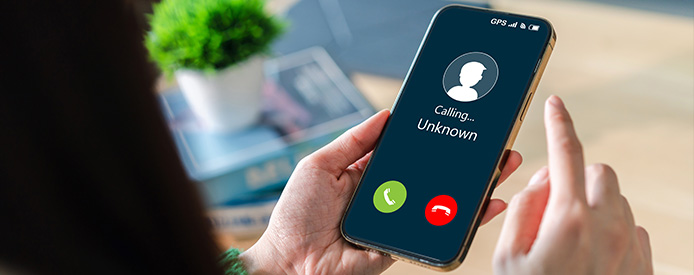
According to the IRS, thousands of people have been impacted by tax scams. At Bethpage, we want to help you recognize and avoid these kinds of scams.
IRS Debt Collection Scam
Fraudsters make unsolicited calls claiming to be IRS officials. They attempt to trick the potential victim into paying a phony tax bill, usually requiring payment through a wire transfer, a prepaid debit card or gift card. They may also leave “urgent” callback requests through phone “robo-calls,” or send a phishing email.
These types of scams sometimes use threats to intimidate and bully a victim into paying. They may even threaten to arrest, deport, or revoke the driver’s license of the victim if they do not get the money.
Fraudsters often alter caller ID numbers to make it look like the IRS or another agency is calling (“spoofing.”) The callers use IRS employee titles and fake badge numbers to appear legitimate. They may use the potential victim’s name, address, and other personal information to make the call sound official.
It’s important to know that the IRS will never:
- Call to demand immediate payment using a specific payment method, such as a prepaid debit card, gift card or wire transfer. Generally, the IRS will first mail a bill to any taxpayer who owes taxes.
- Threaten to immediately bring in law enforcement to have the taxpayer arrested for not paying.
- Demand that taxes be paid without giving taxpayers the opportunity to question the amount owed.
- Ask for credit or debit card numbers over the phone.
Important things to know if contacted about delinquent taxes by an IRS private collector:
- Private collectors for the IRS cannot accept direct payments — all payments should be made to the U.S. Treasury. The agency will not require specific types of payments, such as wire transfers or prepaid debit cards. Scammers prefer these methods because they are hard to trace and can be redeemed anywhere in the world.
- IRS private collectors will contact you by a mailed letter. Debtors must be sent a written “validation notice” stating the amount owed within five days after first contact. No harassing, abusive, or threatening language is allowed.
- Certain tax bills (and, therefore, phone calls) cannot be handled by private collectors for the IRS — those for taxpayers who are deceased, under age 18, in a designated combat zone, or a victim of identity theft. Debtors currently in audit, litigation, or criminal investigation are also off-limits to third-party private collectors.
Things you can do if you are targeted:
- Do not give out any information. Hang up immediately.
- Contact the Treasury Inspector General for Tax Administration (TIGTA) to report the call. Use the “FTC Complaint Assistant” on FTC.gov. Please add “IRS Telephone Scam” in the notes.
- Categories:



